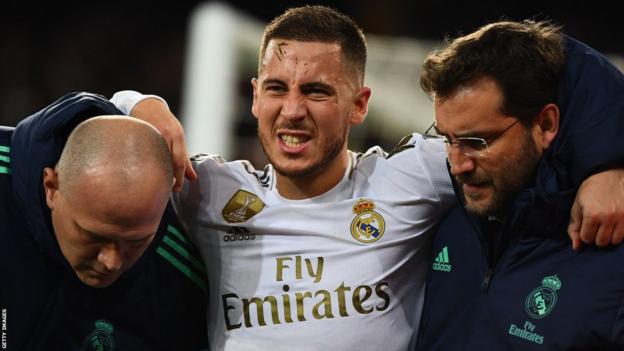

Four years ago, Eden Hazard was flying high.
Seven superb seasons with Chelsea, yielding two Premier League titles and the 2014-15 player of the season award, had established Hazard as one of the best players in the world and earned a dream £89m move to Real Madrid.
Expectations in Spain were high, especially as Hazard arrived one year after Cristiano Ronaldo’s departure to Juventus and at a time when Gareth Bale was out of favour with Real Madrid manager Zinedine Zidane.
They were very big shoes to fill, but 110 goals and 75 assists for Chelsea had demonstrated Hazard’s ability to consistently excite and exhilarate at the highest level. Aged 28, he was theoretically in his prime, and the move to Madrid was supposed to signal a glorious conclusion to his career, filled with goals, assists and trophies.
Instead, the opposite transpired.
The first alarm bells were sounded when Hazard reported for duty in Madrid looking out of shape, prompting speculation that he had used a rare summer off to celebrate his transfer a tad too enthusiastically.
After missing the start of the season with a hamstring injury, he gradually started to find form. Hazard scored his first goal for Real in October 2019 in his first home start against Granada, and there were promising hints of a blossoming understanding with forward Karim Benzema.
Just as Hazard was starting to approach top form, though, he was derailed by injury. A nasty tackle by Paris St-Germain defender Thomas Meunier during a Champions League game in November 2019 damaged his right ankle, keeping him on the sidelines for nearly three months.
Then, shortly after he returned to fitness, the Covid pandemic struck. Hazard was again consigned to inaction, further frustrating his efforts to gain sharpness and rhythm in his new environment.
After the Covid-enforced hiatus, Hazard did stay fit for the remainder of the 2019-20 campaign and played a bit-part role as Real secured the La Liga title. But his form was indifferent, and the rapid emergence of gifted young Brazilian wingers Vinicius Junior and Rodrygo meant his status as a guaranteed starter was lost.
For the next three years, Hazard found himself stuck in an increasingly miserable loop. He would give glimpses of his undoubted class, suffer injury, slowly return to fitness amid allegations over his levels of physical commitment, give more brief glimpses, suffer another injury… and repeat.

By the 2021-22 season, when Real triumphantly claimed a La Liga and Champions League double, he had become an afterthought.
A forgotten man, Hazard was largely overlooked by boss Carlo Ancelotti as he started just eight games in those two competitions, scoring no goals and recording just one assist.
The final season was even more anonymous as Hazard tasted just 395 minutes of action, making his last appearance in a Real shirt on 13 May with a suitably uneventful hour during a 1-0 win against Getafe – no shots, no chances created, and the only goal coming after he had been substituted.
When he subsequently left Real at the end of the season there was no fanfare, no recriminations, not really much of anything other than a sad acknowledgment that things just had not worked out.
The stats of Hazard’s four seasons in Spain paint a sorry picture: 76 appearances (32 of them as a substitute), seven goals and nine assists. Perhaps even more damningly, he only started two games in the Champions League knockout stages and never played a single minute of a Clasico against Barcelona.
Nevertheless, none of this means that we should dismiss Hazard as a failure, because his career offers a perfect example of why nuanced analysis is generally more accurate than simple black-and-white condemnation or celebration.
Yes, Hazard’s time in Spain was a let-down. But there are good reasons for that – he was never the same player after that tackle from Meunier, he had to cope with Covid confinement a few months after moving to a new country, and it is easy to understand how goals being outnumbered by injuries started to erode his confidence and motivation.
We also cannot forget that his time at Chelsea was truly spectacular. Aside from the omnipresent duo of Lionel Messi and Cristiano Ronaldo, who cast everyone else in their unavoidable shadows throughout the 2010s, there were times when Hazard had a fair claim of being the best player in the world.
After joining from Lille in 2012, he quickly became a key player and helped the Blues win the Europa League in his first season.
Better was to follow, as he was named in the PFA Premier League team of the season on four occasions, scoring at least 13 goals every season except a disappointing 2015-16 campaign, and creating dozens more with his electric dribbling and astute eye for a pass. He was a thrilling player who Chelsea fans adored, and neutrals loved to watch.
Perhaps, though, Hazard’s career is best summed up by his exploits on the international stage.
He ranks fourth in Belgium’s all-time appearance list and second in goalscoring – 126 and 33 respectively – and captained his country during a period of unprecedented success.
With the likes of Kevin de Bruyne, Vincent Kompany, Thibaut Courtois and Romelu Lukaku for company, Hazard was the most important member of Belgium’s golden generation which, for a while, was regularly considered a realistic candidate for major trophies and knocked out Brazil on the way to finishing third at the 2018 World Cup.
Yet Belgium never won anything, or reached a final. They were a very good team, and at times they were great. Yet there is a lingering suspicion that they could – and maybe should – have been even better.
The same, one could argue, applies to Hazard. – bbc.com